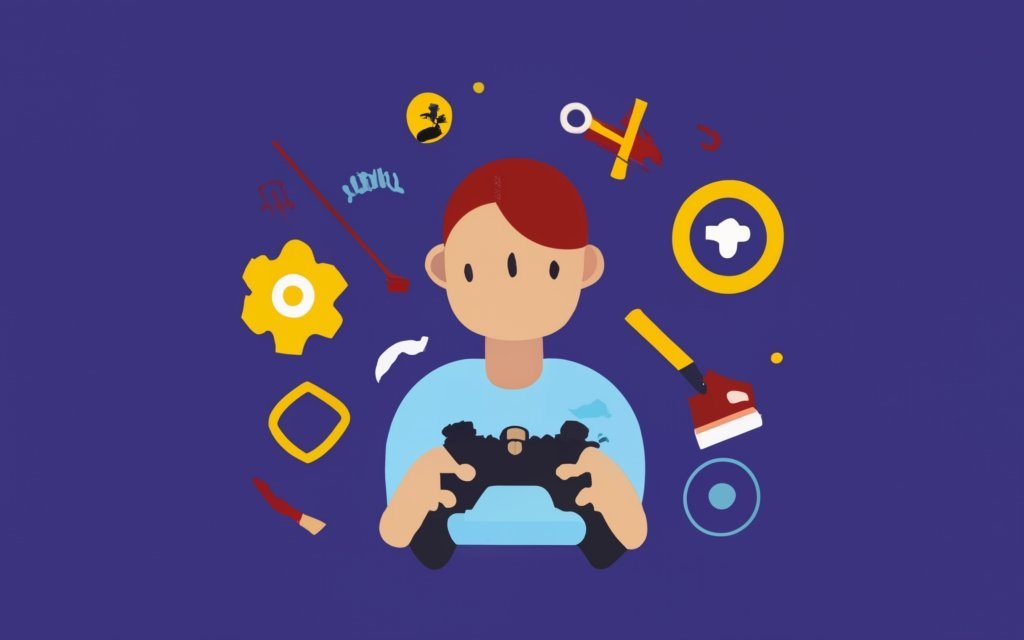Video games, especially those with violent themes, have become a significant part of our culture. They are not just entertainment, but also a reflection of the society we live in. Understanding the impact of video game violence on prosocial behavior is crucial as it can provide insights into the potential effects of these games on the young, who are often the primary users.
Importance and Relevance.
The relevance of this topic cannot be overstated. With the increasing prevalence of violent video games, it is essential to understand their potential effects on young people. This is particularly important given the growing body of research that suggests a correlation between violent video games and aggressive behavior in adolescents.
The article delves into the effects of violent video games on prosocial behavior. It explores the concept of prosocial behavior, which is the willingness to help others and contribute positively to society.
The article also discusses the concept of empathic concern, benevolence, and self-regulation, which are potential mediators of the associations between playing violent video games and prosocial behavior.
Video Game Violence and Moral Judgment.
In the realm of video games, violence is a common theme. This violence is not just a game mechanic, but it also reflects the moral judgments of society. Understanding how this violence impacts the moral judgments of the players is crucial in assessing the potential harm these games may cause.
The relevance of this topic lies in the increasing normalization of violence in video games. As violent video games become more prevalent, it is essential to understand their potential impact on the moral judgments of players. This is particularly important in the context of adolescents, who are often the primary users of these games.
Brief Overview of the Article.
The article investigates the impact of violent video games on the moral judgments of players. It discusses the concept of moral judgment, which is the process of making ethical decisions based on moral principles.

The article also explores the potential mediators of the associations between playing violent video games and moral judgments, including empathic concern, benevolence, and self-regulation.
Empathy and Aggression in Video Games.
Definition of Empathy and Aggression in Video Games.
In the context of video games, empathy refers to the ability to understand and share the feelings of others. It is a crucial component of interpersonal relationships and plays a significant role in how we interact with others, including the characters in video games.
On the other hand, aggression in video games often refers to the violent actions that players can take within the game. This can range from physical attacks to strategic battles, and it is a common theme in many violent video games.
Role of Empathy as a Protective Factor in Mitigating the Negative Effects of Video Game Violence.
Empathy can serve as a protective factor against the negative effects of video game violence. Research has shown that empathy can reduce aggression to a certain extent. High and low empathy conditions had different effects: the reduction of aggression in the low empathy condition was not as evident as that in the high empathy condition for hostile emotions.
Furthermore, in implicit aggression evaluation, aggressive cognition in the low empathy condition clearly dropped and was higher in the high empathy condition than in the low empathy condition. This indicates that the difference in empathy could be an important factor affecting the function of empathy within the game.
Moreover, the interaction between empathy and moral attributes showed that the implicit aggression of players fulfilling just roles was higher than that of those playing unjust roles. Furthermore, the effect of empathy differed across different moral attributes of the game characters.
Although the effect was not very obvious, empathy could have eased player aggression when they played unjust roles. Conversely, empathy enhanced player aggression playing just roles, the effect of which was more obvious in the high empathy condition.
This is consistent with the findings made by previous studies and shows that the effect of empathy in video games can be affected by game character features.
Effects of Violent Video Games on Empathy and Aggression.
Overview of the Literature.
Research on the relationship between violent video game play and empathy has produced mixed results. Some studies suggest that violent video games can increase aggressive cognition, emotion, and behavior, and decrease players’ empathy, which negatively impacts players’ social behavior.
However, other studies have found no significant impact on empathy from violent video game play. The reasons for these differing results could be due to various factors, such as the type of video game, the player’s pre-existing attitudes and behaviors, and the context in which the game is played.
Discussion of Findings from Various Studies.
One study found that exposure to violent video games is positively related to adolescent aggression. It also suggested that normative beliefs about aggression have a mediating effect on exposure to violent video games and adolescent aggression.
However, the family environment can moderate the mediation effects of normative beliefs about aggression in exposure to violent video games and adolescent aggression. This means that the impact of violent video games on aggression can be influenced by the player’s family environment.

Another study found that empathy can remit aggression to a certain extent. High and low empathy conditions had different effects: the reduction of aggression in the low empathy condition was not as evident as that in the high empathy condition for hostile emotions.
Furthermore, in implicit aggression evaluation, aggressive cognition in the low empathy condition clearly dropped and was higher in the high empathy condition than in the low empathy condition. This indicates that the difference in empathy could be an important factor affecting the function of empathy within the game.
Examination of the Role of Empathy and Morality in the Context of Violent Video Game Characters and Their Influence on Gamers’ Aggression.
The interaction between empathy and moral attributes showed that the implicit aggression of players fulfilling just roles was higher than that of those playing unjust roles. Furthermore, the effect of empathy differed across different moral attributes of the game characters.
Although the effect was not very obvious, empathy could have eased player aggression when they played unjust roles. Conversely, empathy enhanced player aggression playing just roles, the effect of which was more obvious in the high empathy condition.
This is consistent with the findings made by previous studies and shows that the effect of empathy in video games can be affected by game character features.
A possible reason for this could be that the empathy materials, describing the features of the game characters, provided a basis for justifying the character’s aggressive behavior, thereby making players more inclined to judge the behavior of just game characters as being reasonable, and enhancing their aggression.
Long-term vs. Short-term Effects.
Comparison of the Effects of Short-term and Long-term Exposure to Violent Video Games on Empathy and Aggression
The effects of violent video games on empathy and aggression can vary based on the duration of exposure. Short-term exposure to violent video games can lead to a temporary increase in aggressive thoughts and feelings.
However, these effects are typically short-lived, lasting less than 4 minutes. On the other hand, long-term exposure to violent video games can have more lasting effects on aggression and empathy.
Studies have shown that violent video game play can lead to increased aggressive cognition and affect, which in turn results in behavioral aggression. This is consistent with the General Aggression Model (GAM), which suggests that violent video game play can increase aggressive cognition and affect, leading to behavioral aggression.
Furthermore, violent video game play can also have a contagious effect on a player’s social network, suggesting that violent video game play can influence the aggression levels of those around the player.
Discussion of the Potential for Desensitization and Blunted Empathy in Long-term Players of Violent Video Games
Long-term exposure to violent video games can potentially lead to desensitization and blunted empathy. This is due to the fact that violent video games often involve repetitive acts of violence, which can lead to a desensitization to the violence.
This desensitization can potentially lead to a blunting of empathy, as players may become accustomed to the violence and fail to empathize with the characters or situations in the game.
Moreover, violent video games can also lead to a normalization of violence, which can further contribute to desensitization and blunted empathy. This is because violent video games often portray violence in a way that is entertaining or rewarding, which can lead to a normalization of violence.

This normalization can potentially lead to a blunting of empathy, as players may become accustomed to the violence and fail to empathize with the characters or situations in the game.
In conclusion, both short-term and long-term exposure to violent video games can have significant effects on empathy and aggression. However, the specific effects can vary based on factors such as the duration of exposure, the nature of the video game, and the individual player’s pre-existing attitudes and behaviors.
Influence of Game Character and Morality.
- Examination of the impact of game character and morality on gamers’ empathy and aggression4
- Discussion of the role of empathy and morality in the context of antisocial and prosocial games4
Cultural and Individual Factors.
Exploration of the Influence of Cultural and Individual Factors on the Relationship Between Video Game Violence and Empathy
Cultural and individual factors can significantly influence the relationship between video game violence and empathy. For instance, cultural norms and values can shape how individuals perceive and react to violence in video games. Individual factors such as personality traits, attitudes, and beliefs can also influence how individuals interact with violent video games.
A study involving Chinese university students found that the aggression of unjustified-role players was higher than that of justified-role players following gameplay. This suggests that the morality of the game character can affect the player’s empathy and aggression.
Furthermore, the study also found that in justified-role players, the aggression of individuals with high or low levels of empathy was lower than the aggression of those without empathy. The opposite was seen in unjustified-role players. This indicates that both the game character and the player’s empathy can influence the player’s aggression.
Discussion of the Potential for Social Responsibility and Empathy toward Victims of Violence to Decrease the Effects of Violent Video Games.
Social responsibility and empathy toward victims of violence can potentially decrease the effects of violent video games. Social responsibility can influence how individuals perceive and react to violence in video games. For instance, individuals who perceive themselves as socially responsible may be more likely to question the violence in video games and challenge the game’s narrative.
Empathy toward victims of violence can also influence how individuals perceive and react to violence in video games. For instance, individuals who empathize with the victims of violence in video games may be more likely to question the violence and challenge the game’s narrative. This can potentially decrease the effects of violent video games on empathy and aggression.
In conclusion, both cultural and individual factors can significantly influence the relationship between video game violence and empathy. Therefore, it is crucial to consider these factors when designing video games to ensure that they promote prosocial behavior and mitigate the potential negative effects of violent video games.
Conclusion.
Summary of the Current State of Research on the Relationship Between Video Game Violence and Empathy
The current state of research on the relationship between video game violence and empathy is complex and multifaceted. Some studies suggest that violent video games can increase aggressive cognition, emotion, and behavior, and decrease players’ empathy, which negatively impacts players’ social behavior.
However, other studies have found no significant impact on empathy from violent video game play. The reasons for these differing results could be due to various factors, such as the type of video game, the player’s pre-existing attitudes and behaviors, and the context in which the game is played.
Call for Further Research to Better Understand the Complex Interplay Between Video Game Violence, Empathy, and Aggression
Given the complex interplay between video game violence, empathy, and aggression, it is crucial to continue researching this topic. This includes exploring the role of individual and cultural factors, the impact of game characters and morality, and the long-term effects of violent video game play.
Understanding these complex relationships can help us better design video games that promote prosocial behavior and mitigate the potential negative effects of violent video games.
Moreover, it is important to consider the potential for social responsibility and empathy toward victims of violence to decrease the effects of violent video games.
Individuals who perceive themselves as socially responsible or who empathize with the victims of violence in video games may be more likely to question the violence and challenge the game’s narrative, potentially decreasing the effects of violent video games on empathy and aggression.
In conclusion, the relationship between video game violence and empathy is a complex and evolving topic that requires further research.
By understanding this relationship, we can better design video games that promote prosocial behavior and mitigate the potential negative effects of violent video games. Consider reading another article i wrote about >>>> Video Game Violence and Moral Judgment to learn more.






